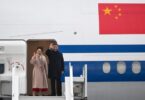Li Chao
German Chancellor Olaf Scholz led a high-level business delegation and three federal ministers on a visit to China, which concluded on April 16, signifying Germany’s willingness to strengthen cooperation with China. China-Germany relations are at the forefront of China’s ties with Europe, and the two nations work closely on global governance.
In the face of geopolitical conflicts, a sluggish world economy and the risk of a global disorder, China and Germany, as two major countries, should expand cooperation and inject stability into a world undergoing tumultuous changes.
Germany has long been the economic “locomotive” of the European Union, particularly during the tenure of Angela Merkel as chancellor, a period when Germany played a key role in lifting the EU out of its debt crisis. Since the Russia-Ukraine crisis broke out, the German economy has been hit hard, sliding into recession last year. Nevertheless, the country remains an important anchor of the European economy. In fact, Germany’s manufacturing-dominated economy is still highly competitive. While the country’s total exports dropped 1.4 percent last year, the exports of machinery and auto products grew 8.9 percent and 5.5 percent respectively, underscoring the strength of “made in Germany”.
Germany’s public debt-to-GDP ratio stood at 64.8 percent, close to the pre-pandemic level, which gives the country larger fiscal policy room compared with most European countries. Germany is also the largest contributor to the EU’s budget, accounting for over one-fourth of the bloc’s funding, and it overtook Japan as the world’s third-largest economy in 2023, which means it should shoulder a heavier responsibility in preserving global economic stability. With the world economic and trade order disrupted by geopolitical conflicts, China and Germany, as the world’s second and third-largest economies, should strengthen coordination and bring more benefits to the world.
The priority is to stabilize the bilateral economic and trade ties and inject more vitality into the two countries’ growth through win-win cooperation. Despite domestic political obstruction, German enterprises still attach high importance to the Chinese market. Last year, German companies’ direct investment in China reached a new high of 11.9 billion euro ($12.7 billion), a year-on-year increase of 4.3 percent. On the other hand, various affordable products from China have helped Germany maintain lower inflation and ensure the security of supply chains. The two countries, with their respective advantages, have jointly provided abundant products to the rest of the world and eased global inflation pressure. Therefore, stable China-Germany economic relations are of immense significance for the world.
Moreover, China and Germany should jointly smooth global supply chains, reject “decoupling” and the severing of industry and supply chains, and break “small yards with high fences”. The two countries also need to safeguard and improve the global financial system, uphold the rules of the World Trade Organization, enhance coordination in macroeconomic policies, support the internationalization of the renminbi and the euro, and foster more inclusive economic globalization. Order is considered to be a key element of German culture. “Ordnung muss sein”, which roughly translates as “there must be order”, was first introduced by Martin Luther in the 16th century. After World War II, Germany recognized the international order with the United Nations as the core, and has since been committed to solving crises and promoting peace under the framework of the UN system.
As the risk of a “new Cold War” looms large, China and Germany, as responsible countries, should oppose a “new Cold War “and bloc confrontations, uphold multilateralism and peaceful development, and safeguard the UN-centered world order. In recent years, the German political situation has encountered severe challenges such as declining support for the traditional ruling party, and the rise of far-right populism and political polarization. In addition, an economic downturn has worsened the livelihoods of ordinary people, and sparked nationwide strikes in the agriculture, transport and public service sectors, severely disrupting social order.
Germany also faces other headaches such as immigration problems. As the main destination for refugees going to Europe, Germany is grappling with a massive influx of refugees, which threatens the country’s social order. Another problem is its housing shortage.
The Scholz government failed to deliver its promise of building 400,000 housing units a year, drawing sharp criticism. These governance problems threaten social stability and public welfare, which constitute the very foundation of the country’s political stability, and in turn have an impact on the global situation. Under the new circumstances, both China and Germany face the challenges of promoting socioeconomic development, and creating a stable environment for growth. The two countries, with their respective wisdom and experience in governance, can share experience in areas such as social security, healthcare and education, an aging society, industrial policy and data security, thereby jointly contributing their wisdom for building a better world.







